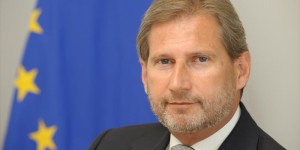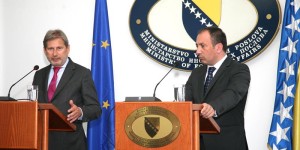12 February 2014
Do you agree with comments that violence
showed by some of protesters has become an excuse to BiH authorities
for not meeting justified requests of citizens which were presented in a
peaceful manner?
Well, let me first of all say that we have
been out as European Union representatives here immediately to call for
an end to violence. Peaceful protests according to the law, in line with
democratic standards, are anyone’s right and for anyone who wishes to
do so in society. It is very important for us, as the European Union,
that we have the country with a vital civil society and that we listen
to them.
I think what we have seen in the last days are
demonstrations without violence, which is good. We see that a number of
suggestions are coming out. High Representative Ashton has taken note of
these. Some of the things, you would expect to see [BiH] authorities to
address here. We see that some of the authorities are already saying
this and addressing these things in their statements. We will see if
there will be any action. But, I think that is very important to
underline that peaceful protest is the way forward.
Are early
elections the only viable solution for present complex situation in the
country, as part of BiH elite claims? How to organise possible early
elections when the current Election Law does not foresee early or
extraordinary general elections?
It’s a question, of course,
that Central Election Commission should answer, because it’s a very
technical one, as far as I understand. There are several laws to be
changed, and I understand that you will have to do constitutional
changes as well. So, it’s technical. I am not in a position to answer,
nor am I an expert. It should be the Central Election Commission
answering that, but as far as I understood from my advisers and my
lawyers and from others, it’s very complex.
If political parties
could agree on it, then everything is possible; and in that respect,
that’s the response. What I think is important is that these things that
have been brought up in the demonstrations, the points that were made –
that should be addressed, that good governance is established. Those
who are elected to govern, they can govern and in doing so get into
action and discussion about those issues.
Many of those
socio-economic issues that they [citizens] are putting forward, those
are issues also to be done in the context of the EU integration process
and those will have to be discussed. Therefore we, as always stand ready
to, with our expertise, show how it is handled in other places, and to
help, if that’s necessary for the dialogue inside Bosnia and
Herzegovina.
Political leaders are those who should agree
about the law and constitutional changes, in general, but also to
enable early elections. Isn’t this non-agreement what provoked
dissatisfied citizens to ask for the solutions on the streets?
I
think that, again, based on what demands we have and that have been put
up; what demonstrators are calling for – it’s a long-term issue for the
whole country namely in the social and economic situation. It is
correct that there has been some disagreement between politicians; but I
don’t think you can use that as a reason or excuse for why an agreement
should not be made.
How do you comment on attempts of
majority of political leaders in BiH to use protests for further ethnic
division in the country? How can that be stopped?
Well what I
think is very important, what also the EU ambassadors jointly said the
other day, is that peaceful demonstrations pointing out issues such as
social and economic problems in a country cannot, should not and must
not be turned into an ethnic issue. Because that’s not what it is.
Fortunately
enough, the demonstrations we had and demands we’ve seen are focused on
the real life issues, the day to day issues. We don’t see this turning
any other way. Also we have been very clear, it is the EU’s position and
all other partners from outside the EU as well – it’s very important
that stability is maintained and that we address those issues, the
wellbeing and the life of people.
How such kind of citizens’
“rising” could actually help the EU integration process of BiH? We are
witnessing that in some more advanced countries, there are violent
demonstrations, with greater damage, with many more people on the
streets? We had examples from Greece, Portugal, and Ireland. How
citizens could help EU integration process of BiH?
Well, I
don’t think that violence has anything to do with the EU path of BiH.
What I think is; that you have an offer as a sovereign country within
your borders, within your structures to join eventually, when you are
ready, and we are there. These sorts of things we have now, economic
issues are actually the issues that many countries are grappling with.
I
firmly believe that a number of answers to the questions that are being
raised would be addressed in the EU integration process; and that is
the reason why we very much hope that we will get to a point that
actually the process will go forward. And we can get to a situation of
negotiation [for EU membership]. Because then we would be able to
address some of those things. It is difficult, it is reforms that have
to be done, sometimes these are tricky, but I’m quite convinced that
actually you do have within the country to do it.
In the
upcoming period, Commissioner Fule and HR/VP Ashton will pay a visit to
BiH. In which light those visits will be done? With the old agenda, or
some new event and issues will be raised during the upcoming talks?
You’re
right that there have been some announcements, not official yet, that
they will visit us. I still don’t know the timings of this. I think it
is a very important message that EU actually cares and that the EU
follows what is actually happening here against the backdrop of events
around the world happening at the same time. So I have to say, the way I
would see the visits like these are that they are very important and
positive and it’s a very good chance for leaders here, politicians and
institutions here to relate how they see it.
I think decision
making on behalf on the EU, is based on real hard information that we
get including directly from the leadership. What will be the contents of
the meeting, whenever they are settled, whenever we have them ready?
There will be the issues we know and they will be discussed.
Of
course there are also the chances of those interlocutors that we meet to
bring other issues; and I think rather than expecting the EU to come
with a ready made agenda we would like very much to see, like we always
do, the interaction with the interlocutors from here, how they see
things could be resolved. So I think, we will have a broad discussion, I
don’t think we will get away from the old issues too, but we will see.



